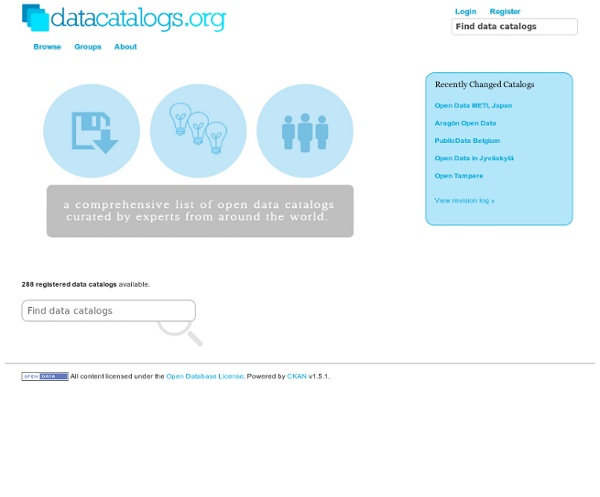



ited Nations Statistics Division New York, 1 June 2016 - The chair of the Statistical Commission, Ms. Wasmalia Bivar of Brazil, addressed the Economic and Social Council (ECOSOC) on 1 June during its Coordination and Management Meeting. Ms. Bivar, who provided her briefing by videolink, informed the Council that the Statistical Commission at its last session in March had agreed “as a practical starting point” on a global indicator framework, which had been developed by the Inter-agency and Expert Group on Sustainable Development Goal Indicators (IAEG-SDGs). Open Data & the Local Newspaper Greg Hadfield recently commented on the effect that open data technologies are having on local newspapers. He writes, “For the last few years, much of my thinking has shifted from journalism and newspapers, to democracy, data, cities and start-ups. A barely articulated premise has been that one day – surely not too far away – there will be ubiquitous, free, high-speed internet access available to everybody via a myriad devices. Connectivity – and the ‘connectedness’ it engenders – will be the air we breathe.
The Open Data Effect: Creating Optimistic Radicals at OKFest I am Stephen Davenport, Director of Innovation at Development Gateway, and recently I attended my first Open Knowledge event, the OKFestival in Helsinki Finland. As a development professional with a technology background I am often skeptical of such events as too soft a subject. What is knowledge anyway? It’s too generic. It’s too easy to immerse yourself in the theoretical and loose sight of the practical. However, it seems I am behind the times. Why Governments Open: Technology and Inclusive Institutions in Developing Countries [Editor's note: Tomorrow, Josh Goldstein is presenting on this topic as part of the CITP Luncheon Series, at the Woodrow Wilson School on Princeton's campus. (12:10pm, in Robertson Hall room 023)] Around the world, societies generally agree that governments and bureaucrats should use the coercive power of the state, not to create extractive institutions that appropriate resources to the powerful elite, but rather to create inclusive institutions, which re-distribute political power and underpin economic institutions that provide incentive for investment and innovation (Acemoglu, Johnson & Robinson 2004). The Open Government Partnership (OGP), a high-level political movement dedicated to transparency, responsiveness and accountability, is underpinned by the notion that institutions, rather than culture or geography, are the fundamental cause of long-run growth, and that inclusive politics shapes economic institutions, rather than the other way around.
Project of the Day: The Canadian Health Hackatons “Hacking Health is a hackathon that is focused on social innovation more than technical innovation. Our approach to improve healthcare is to pair technological innovators with healthcare experts to build realistic, human-centric solutions to front-line healthcare problems”. In Tim Review, Jeeshan Chowdhury relates their experience: “With the urgent need for disruptive innovation in health and the social barriers to change that currently exist, a group of young professionals spanning medicine, technology, and policy proposed an experiment to test whether the hackathon model could be applied not only to the development of projects but also to interdisciplinary teams. The experiment was Hacking Health, the first health-focused hackathon in Canada.
San Francisco looks to tap into the open data economy As interest in open data continues to grow around the world, cities have become laboratories for participatory democracy. They’re also ground zero for new experiments in spawning civic startups that deliver city services or enable new relationships between the people and city government. San Francisco was one of the first municipalities in the United States to embrace the city as a platform paradigm in 2009, with the launch of an open data platform. Years later, the city government is pushing to use its open data to accelerate economic development.
Wikidata Wikidata (www.wikidata.org) aims to create a free knowledge base about the world that can be read and edited by humans and machines alike. It will provide data in all the languages of the Wikimedia projects and allow for the central access to data in a similar vein as Wikimedia Commons does for multimedia files. Wikidata is a new Wikimedia hosted and maintained project. The initial development of the project is funded with a generous donation by the Allen Institute for Artificial Intelligence [ai]2, the Gordon and Betty Moore Foundation, and Google, Inc. The Benefits of Open Data (part II) – Impact on Economic Research This blog is cross-posted from the OKFN’s Open Economics blog A couple of weeks ago, I wrote the first part of the three part series on Open Data in Economics. Drawing upon examples from top research that focused on how providing information and data can help increase the quality of public service provision, the article explored economic research on open data.
Prime minister’s special envoy ‘disappointed’ with open data use Prime Minister David Cameron’s special envoy on the UN’s post-2015 development goals has said that he is ‘disappointed’ by how much the government’s open datasets have been used so far. Speaking at a Reform event in London this week on open government and data transparency, Anderson said he recognises that the public sector needs to improve the way it pushes out the data so that it is easier to use. “I am going to be really honest with you. As an official in a government department that has worked really hard to get a lot of data out in the last two years, I have been pretty disappointed by how much it has been used,” he said. The UK government is investing heavily in transparency, where minister for the Cabinet Office, Francis Maude, recently launched a white paper that detailed the government’s drive to release data into the public domain for analysis and re-use.